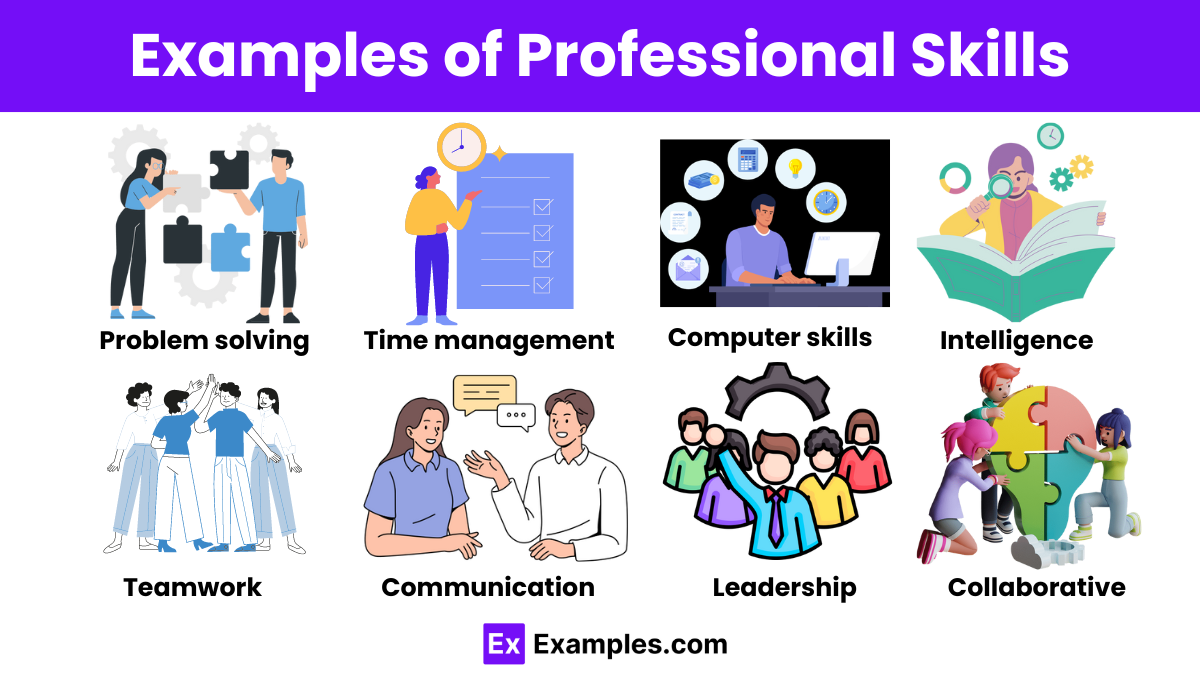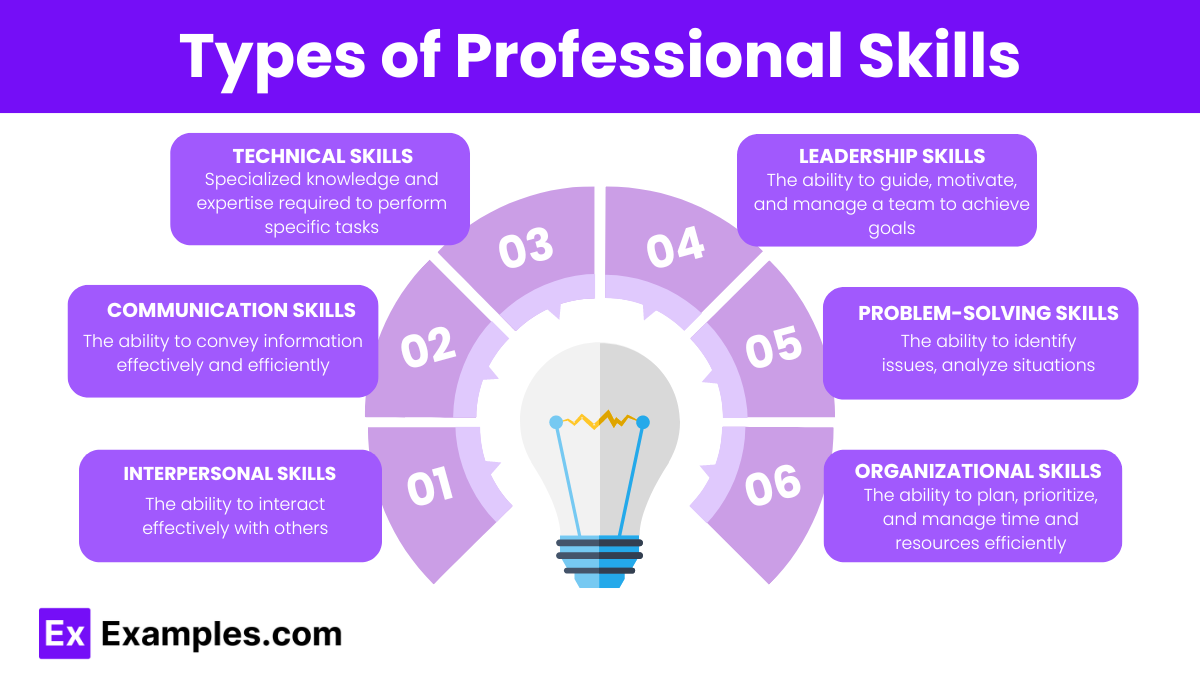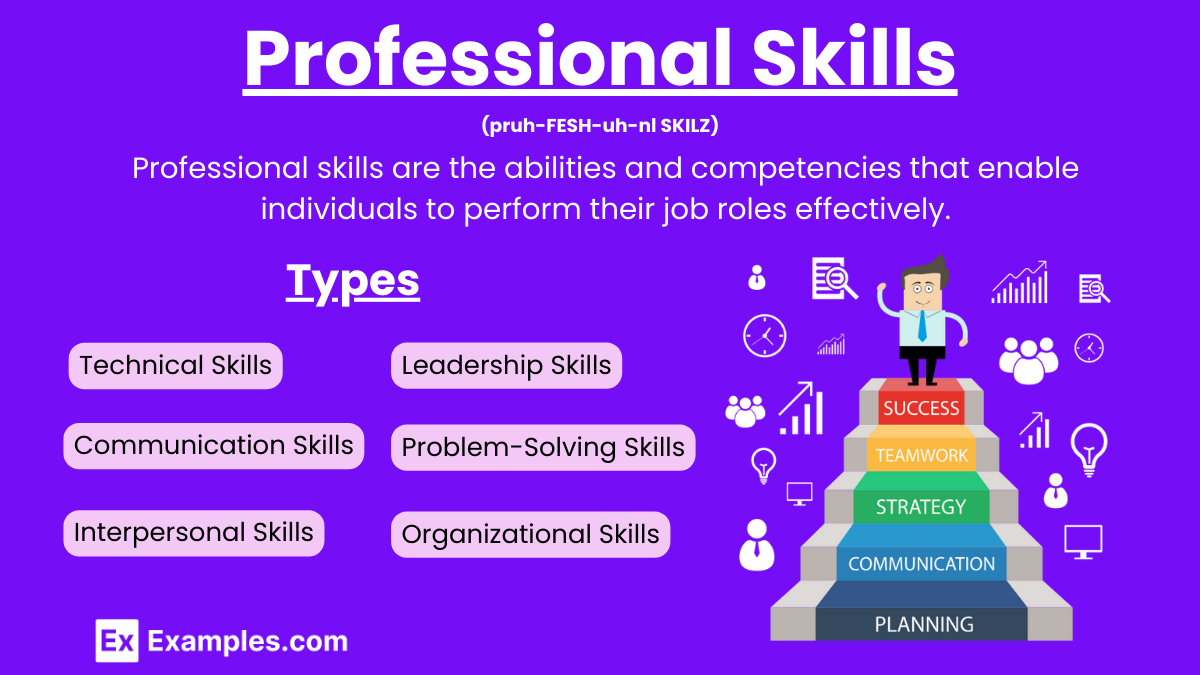34+ Professional Skills Examples
Professional skills refer to the abilities and competencies that individuals acquire and develop to perform tasks effectively and efficiently in a work environment. These skills encompass a wide range of technical and soft skills that are essential for career success and professional growth. Recognizing your personal strengths allows you to leverage them effectively, helping you achieve your goals and contribute positively to your team or organization. Identifying communication strengths is particularly important, as effective communication can enhance your ability to lead, collaborate, and solve problems. Assessing your strengths and weaknesses provides a balanced view, allowing you to address areas for improvement while maximizing your inherent capabilities.
What are Professional Skills?
Professional skills are the abilities and competencies that enable individuals to perform their job roles effectively and efficiently. These skills encompass a wide range of expertise, including technical know-how, interpersonal abilities, problem-solving capabilities, and organizational skills. They are essential for achieving success in the workplace, facilitating collaboration, and driving career advancement. Examples include communication skills, project management, critical thinking, and leadership. Understanding one’s skills can be enhanced by using skills assessment tips to identify areas of proficiency and areas for improvement. Setting clear objectives of communication skills is essential for developing effective interpersonal interactions and professional communication. A well-crafted resume skills summary can highlight an individual’s key strengths and abilities, showcasing their qualifications and making a strong impression on potential employers.
Examples of Professional Skills

- Problem solving
- Time management
- Communication skills
- Adaptability
- Computer skills
- Customer service
- Emotional intelligence
- Critical thinking
- Leadership
- Decision-making
- Project management
- Collaboration
- Interpersonal communication
- Organization
- Active listening
- Flexibility
- Teamwork
- Creativity
- Data analysis
- Conflict resolution
- Negotiation
- Leadership skills
- Speech
Types of Professional Skills

1. Technical Skills
- Description: Specialized knowledge and expertise required to perform specific tasks or use particular tools and technologies.
- Examples: Programming languages, data analysis, graphic design, IT support, engineering skills.
2. Communication Skills
- Description: The ability to convey information effectively and efficiently, both verbally and in writing.
- Examples: Public speaking, writing, active listening, presentation skills, negotiation.
3. Interpersonal Skills
- Description: The ability to interact effectively with others, building and maintaining relationships.
- Examples: Teamwork, empathy, conflict resolution, networking, customer service.
4. Leadership Skills
- Description: The ability to guide, motivate, and manage a team to achieve organizational goals.
- Examples: Decision-making, delegation, mentoring, strategic planning, emotional intelligence.
5. Problem-Solving Skills
- Description: The ability to identify issues, analyze situations, and develop effective solutions.
- Examples: Critical thinking, analytical skills, creativity, troubleshooting, adaptability.
6. Organizational Skills
- Description: The ability to plan, prioritize, and manage time and resources efficiently.
- Examples: Time management, project management, multitasking, scheduling, goal setting.
Importance of Professional Skills
- Enhance Job Performance: Professional skills improve the efficiency and quality of work.
- Career Advancement: Possessing strong professional skills opens opportunities for promotions and career growth.
- Effective Communication: Good communication skills facilitate better collaboration and understanding in the workplace.
- Problem Solving: Strong problem-solving skills enable individuals to tackle challenges and find effective solutions.
- Leadership Development: Leadership skills help in guiding and motivating teams to achieve organizational goals.
- Improved Relationships: Interpersonal skills build strong, positive relationships with colleagues and clients.
- Time Management: Organizational skills ensure tasks are completed on time, enhancing productivity and reducing stress.
How to Develop Professional Skills
- Identify Skill Gaps: Assess your current skills and identify areas for improvement.
- Set Clear Goals: Define specific, measurable goals for skill development.
- Seek Feedback: Regularly ask for constructive feedback from colleagues and supervisors.
- Take Courses and Workshops: Enroll in relevant training programs and workshops.
- Practice Regularly: Apply new skills in your daily work to reinforce learning.
- Find a Mentor: Seek guidance from experienced professionals in your field.
- Read and Research: Stay updated with industry trends and best practices through reading and research.
- Network: Engage with professional networks and attend industry events.
- Reflect and Adapt: Periodically review your progress and adjust your development plan as needed.
Professional Skills for Resume
Technical Skills
- Programming Languages: Proficiency in languages like Python, Java, C++, or JavaScript.
- Data Analysis: Experience with tools like Excel, SQL, R, or Tableau.
- Graphic Design: Skills in Adobe Creative Suite (Photoshop, Illustrator, InDesign).
- Web Development: Knowledge of HTML, CSS, and frameworks like React or Angular.
- Project Management Software: Familiarity with tools like Asana, Trello, or Microsoft Project.
Communication Skills
- Verbal Communication: Effective public speaking and presentation abilities.
- Written Communication: Strong writing skills for reports, emails, and documentation.
- Active Listening: Ability to listen carefully and respond thoughtfully.
- Negotiation: Skilled in reaching mutually beneficial agreements.
Interpersonal Skills
- Teamwork: Ability to collaborate effectively with colleagues.
- Conflict Resolution: Capable of addressing and resolving conflicts amicably.
- Empathy: Understanding and sharing the feelings of others.
- Networking: Building and maintaining professional relationships.
Leadership Skills
- Team Leadership: Experience in leading and motivating a team.
- Decision-Making: Making informed and effective decisions.
- Mentoring: Guiding and supporting junior colleagues.
- Strategic Planning: Developing long-term strategies for success.
Problem-Solving Skills
- Analytical Thinking: Breaking down complex problems and finding solutions.
- Creativity: Thinking outside the box to develop innovative solutions.
- Critical Thinking: Evaluating situations and making logical decisions.
- Troubleshooting: Identifying and fixing technical or operational issues.
Organizational Skills
- Time Management: Prioritizing tasks and managing time effectively.
- Project Management: Planning, executing, and closing projects efficiently.
- Multitasking: Handling multiple tasks simultaneously.
- Goal Setting: Setting and achieving short-term and long-term goals.
Professional Skills for Students
- Time Management
- Communication
- Teamwork
- Problem-Solving
- Adaptability
- Leadership
- Research
- Critical Thinking
- Technical Proficiency
- Project Management
Professional Skills for Freshers
- Emotional Intelligence
- Digital Literacy
- Creative Thinking
- Self-Motivation
- Data Analysis
- Networking
- Conflict Resolution
- Ethical Judgment
- Cross-Cultural Competence
- Agile Methodologies
- Social Media Management
Professional Skills for Customer Service
- Active Listening
- Clear Communication
- Empathy
- Problem-Solving
- Patience
- Positive Attitude
- Time Management
- Product Knowledge
- Conflict Resolution
- Adaptability
- Multitasking
- Attention to Detail
- Teamwork
- Persuasion
- Decision-Making
Professional Skills of a Teacher
- Classroom Management
- Lesson Planning
- Subject Matter Expertise
- Communication Skills
- Patience
- Adaptability
- Creativity
- Empathy
- Organization
- Assessment and Evaluation
- Technological Proficiency
- Collaboration
- Leadership
- Conflict Resolution
- Continuous Learning
Professional Skills Synonyms
| Professional Skill | Synonyms |
|---|---|
| Communication | Articulation, Interaction, Expression |
| Teamwork | Collaboration, Cooperation, Partnership |
| Problem-Solving | Troubleshooting, Analytical Thinking, Resolution |
| Time Management | Scheduling, Prioritization, Planning |
| Adaptability | Flexibility, Versatility, Agility |
| Leadership | Guidance, Direction, Influence |
| Critical Thinking | Analytical Thinking, Judgement, Reasoning |
| Organizational Skills | Coordination, Structuring, Systematization |
| Technical Proficiency | Technical Expertise, Technical Skills, Tech Savvy |
| Creativity | Innovation, Originality, Inventiveness |
| Conflict Resolution | Mediation, Negotiation, Dispute Management |
| Customer Service | Client Support, Customer Care, Customer Relations |
| Empathy | Compassion, Understanding, Sensitivity |
| Patience | Tolerance, Endurance, Composure |
| Self-Motivation | Initiative, Drive, Self-Discipline |
Professional Skills vs Technical Skills
| Aspect | Professional Skills | Technical Skills |
|---|---|---|
| Definition | Soft skills that facilitate working well with others and managing tasks efficiently. | Hard skills related to specific tasks or technologies. |
| Examples | Communication, teamwork, leadership, problem-solving, time management, empathy. | Programming, data analysis, graphic design, IT support, engineering skills. |
| Application | Useful across various roles and industries. | Typically specific to certain roles or fields. |
| Training | Often developed through experience, mentorship, and practice. | Often acquired through formal education, certifications, and training. |
| Measurement | Assessed through feedback, observations, and performance reviews. | Assessed through tests, certifications, and practical demonstrations. |
| Importance | Critical for effective collaboration and leadership. | Essential for performing job-specific tasks and functions. |
| Flexibility | Highly transferable between different job roles and industries. | May be more specialized and less transferable between different job roles. |
| Development | Continuous improvement through personal growth and professional experiences. | Continuous learning through keeping up with technological advancements. |
Uses of Professional Skills
- Career Advancement: Professional skills are essential for career growth and advancement. Employees with a well-rounded skill set are more likely to be promoted, given more responsibilities, and recognized as valuable assets to their organization.
- Job Performance: Professional skills directly impact job performance. Competence in specific technical skills, combined with effective communication, problem-solving, and teamwork, leads to higher productivity and efficiency.
- Networking and Relationship Building: Interpersonal and communication skills are crucial for building and maintaining professional relationships. Networking with colleagues, clients, and industry professionals can lead to new opportunities and collaborations.
- Problem Solving and Decision Making: Professional skills such as critical thinking, analytical abilities, and creativity help individuals identify problems, evaluate options, and make informed decisions. These skills are vital for overcoming challenges and driving business success.
- Leadership and Management: Effective leadership requires a combination of technical knowledge, strategic thinking, and strong interpersonal skills. Leaders use these skills to motivate teams, manage projects, and achieve organizational goals.
- Customer Service and Client Relations: Professional skills are essential for delivering excellent customer service and maintaining positive client relations. Skills such as empathy, active listening, and conflict resolution ensure that customer needs are met and issues are resolved efficiently.
- Project Management: Project management skills, including planning, organizing, and time management, are crucial for successfully completing projects on time and within budget. These skills help coordinate tasks, resources, and team members.
- Adaptability and Flexibility: The ability to adapt to changing circumstances and learn new skills is increasingly important in today’s fast-paced work environment. Professional skills in adaptability and continuous learning enable individuals to stay relevant and competitive.
- Collaboration and Teamwork: Working effectively in a team requires collaboration, communication, and conflict resolution skills. These skills foster a cooperative work environment and contribute to the achievement of common goals.
What is time management?
Time management is the ability to plan and control how you spend your hours to effectively accomplish your goals.
How do I develop leadership skills?
Develop leadership skills by taking initiative, seeking feedback, learning from leaders, and practicing decision-making and team-building activities.
Why is adaptability important in the workplace?
Adaptability allows you to handle change, overcome challenges, and stay relevant in a dynamic work environment.
How can I enhance my problem-solving skills?
Enhance problem-solving skills by practicing critical thinking, analyzing situations, brainstorming solutions, and learning from past experiences.
What is teamwork?
Teamwork is the collaborative effort of a group to achieve a common goal efficiently and effectively.
How can I become a better team player?
Become a better team player by communicating openly, respecting others’ opinions, being reliable, and contributing actively to group tasks.
What role does emotional intelligence play in professional skills?
Emotional intelligence helps you manage your emotions, understand others’ emotions, and build better interpersonal relationships at work.
How can I improve my emotional intelligence?
Improve emotional intelligence by being self-aware, practicing empathy, managing stress, and developing strong social skills.
What is the significance of technical skills in a profession?
Technical skills are specific abilities needed to perform particular job tasks and are crucial for specialized roles.
How can I stay updated with technical skills?
Stay updated with technical skills by attending workshops, taking online courses, reading industry-related materials, and practicing regularly.



